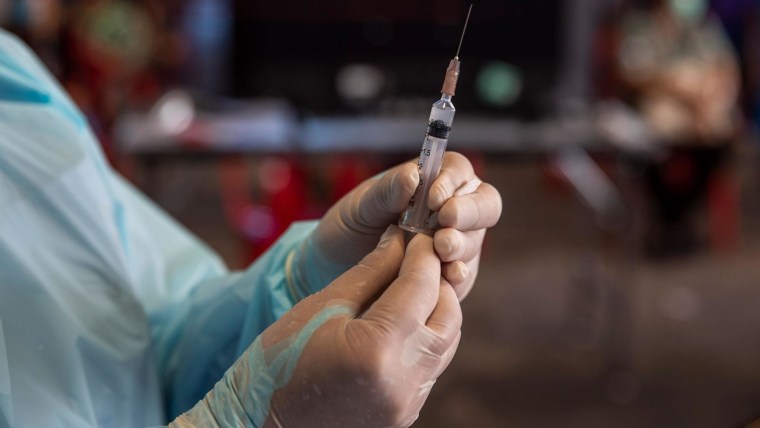WASHINGTON — Federal protocols and other regulatory hurdles are compromising a tool critical to containing the ever-evolving coronavirus: cheap, rapid antigen tests growing in use across Europe to safely reopen schools, public health officials and some members of Congress say.
With variants multiplying, “this virus could get ahead of our vaccines” and “we haven’t seen the same push” on testing as there has been on vaccines, Rep. Kim Schrier, D-Wash., said in a hearing with Dr. Peter Marks, the Food and Drug Administration’s research director; Dr. Anthony Fauci, the government’s top infectious disease expert; and Dr. Rochelle Walensky, director of the Centers for Disease Control and Prevention.
“We need a much greater ability to test asymptomatic people, catch them early and prevent outbreaks that could land us in exactly the same situation,” said Schrier, a pediatrician. “We don’t want to end up playing whack-a-mole.”
There have been some signs that testing is high on the federal agenda. On Tuesday, the FDA announced that it was taking steps to ease the approval process for tests needed to screen students and workers at home, and on Wednesday, the White House announced a $10 billion plan to expand testing in schools.
Still, significant hurdles stand in the way of a uniform national strategy that could better protect children and workplaces as new, more contagious variants spread.
“While this announcement indicates that the administration wants to use frequent rapid testing to make schools safer, we still need to see major regulatory barriers lifted in order for these tests to be available in the home, over the counter and without prescription,” said Dr. Michael Mina, an assistant professor of epidemiology at Harvard University’s T.H. Chan School of Public Health.
The barriers include a federal law that requires schools to get waivers written by physicians to perform rapid tests. Each state has a different regulatory body managing the tests. Asked during a White House briefing Wednesday whether the waiver requirement will be dropped, Carole Johnson, the White House’s testing coordinator, said there was “much more work to do.”
The Biden administration has been focused on mass vaccinations for adults, exceeding its timetable to administer 100 million vaccine doses in 100 days. Yet Fauci, director of the National Institute of Allergy and Infectious Diseases, has said children under 12 are unlikely to be vaccinated until next year at the earliest. Meanwhile, Innova Medical Group, a California company, is shipping millions of the tests a day to Europe while awaiting FDA approval.
The FDA has rejected or is sitting on a number of “high-quality” emergency use authorization applications, Mina said.
“There is truly no good reason,” he said. A recent study by Harvard economist Jim Stock, who was a member of the Council of Economic Advisers during the Obama administration, concluded that a $20 billion rapid testing program would save tens of thousands of lives and add tens of billions of dollars to the economy. The FDA said Tuesday that it was issuing a new template for test developers seeking emergency use authorizations for tests intended to be used on a regular basis.
But that doesn’t take away the need for prescriptions or waiver approvals, which are the biggest hurdles, Mina said.
During the hearing Wednesday, Schrier asked Fauci whether he agreed with her premise about the need for routine home Covid-19 testing.
“I actually have been saying that for months and months,” he replied. “We should be literally flooding the system with easily accessible, cheap, not-needing-a-prescription, point-of-care, highly sensitive and highly specific” tests to do “just what you are saying,” he said.
‘There’s no replacement for the use of this’
Paper-strip antigen tests differ from PCR tests in widespread use in the U.S. While many antigen tests can reach up to 100 percent accuracy in pinpointing the week or so when a person is infectious, they don’t have the same overall sensitivity as PCR tests, which can detect trace virus RNA for weeks after someone became infectious. Antigen tests, which can be processed in as quickly as 15 minutes, are also inexpensive and easy to manufacture, and they can be used at home.
FDA spokeswoman Stephanie Caccomo referred to a recent NPR interview in which acting FDA Commissioner Janet Woodcock acknowledged that the tests work while saying there are “standards that have to be met, and it can be tricky to do these tests.”
“If a test comes to us with good data, we will authorize it as quickly as our scientific review allows,” Caccomo said. “The FDA has and will continue to authorize tests when the data supports authorization. The FDA will not authorize tests where the data is incomplete or does not otherwise support authorization.”
At issue, Mina said, is the FDA’s refusal to change its approval criteria — a decision that he said obscures how effective the tests can be in identifying when people are contagious. He insisted that some doctors and public health experts are “misunderstanding” the issue because the FDA isn’t using infectiousness as the criterion; rather, it is comparing the tests to the PCR tests that yield positive results for weeks on end no matter how much virus is present.
“What we find,” Mina said, is that the antigen tests reach “100 percent sensitivity during that infectious window.”
Dr. Ashish Jha, dean of the School of Public Health at Brown University, told a Senate committee last week that the tests could be an important tool, along with mitigation measures and vaccinations, in stopping spread in the workplace and schools, where asymptomatic cases can be more common among children.
“The FDA has been slow to approve these cheap, rapid antigen tests primarily due to concerns about accuracy and lack of thorough data, and maintaining the rigor and high standards of FDA approval are important. However, rapid tests serve a different role than PCR tests and should be evaluated accordingly,” Jha said.
Mina said now is a critical moment to highlight the need for rapid testing. He and the COVID Collaborative, a group of public health, economic and political leaders, are leading advocates for a rapid testing strategy that he said would require $20 billion.
Mina said Biden is on record supporting that. In his 200-page national strategy to fight Covid-19, Biden specifically cited the need for “major, unified federal investments in rapid testing.” A letter from more than 50 scientists, doctors and epidemiologists called on Congress in December to “support widespread and frequent rapid antigen testing.” Among the signers: Andy Slavitt, a senior White House Covid-19 adviser.
The U.K. has been a leader in leveraging the tests, relying largely on Innova Medical. Dr. Deepti Gurdasani, a U.K. epidemiologist, said the government has made sure that any school wanting to use them has enough. The German Health Ministry recently approved six rapid at-home tests, and it is providing a certain number free to residents at pharmacies and grocery stores.
A handful of rapid antigen tests are approved for at-home use in the U.S., but only one, Ellume, at $30 a test, doesn’t require a prescription. The others require prescriptions and some professional administering.
Some U.S. jurisdictions are already getting waivers and touting the benefits of rapid testing.
Roy Mendiola, superintendent of the McSwain Union Elementary School District in Merced, California, said he has seen “pretty impressive” results since a rapid testing program was implemented in January, early on catching five asymptomatic and pre-symptomatic staff members who could have infected dozens of others while they awaited PCR tests.
“We could implement a dozen or so more protocols,” he said. “But there’s no replacement for the use of this.”
Source: | This article originally belongs to Nbcnews.com












